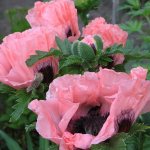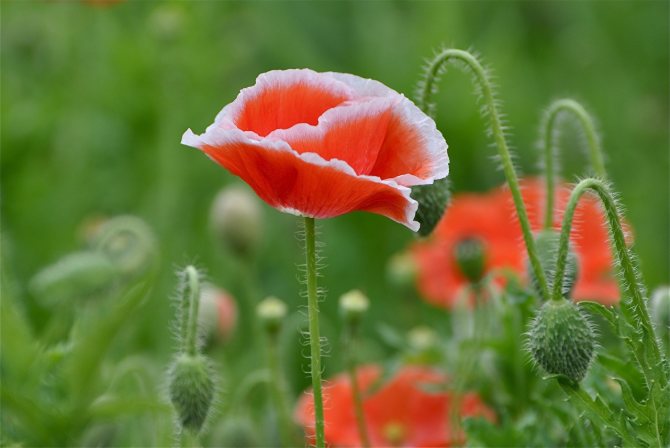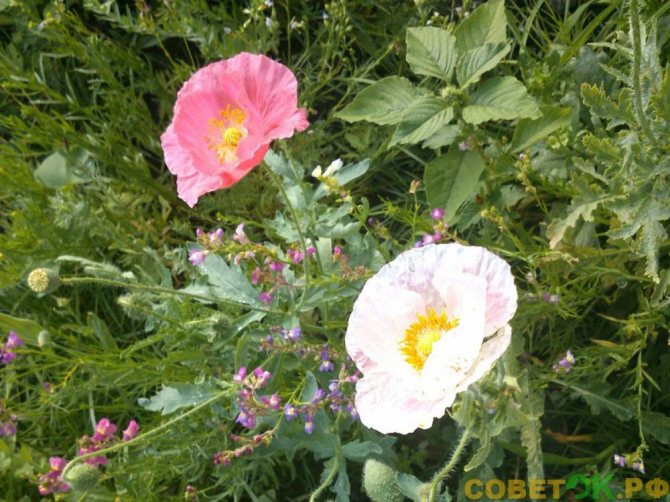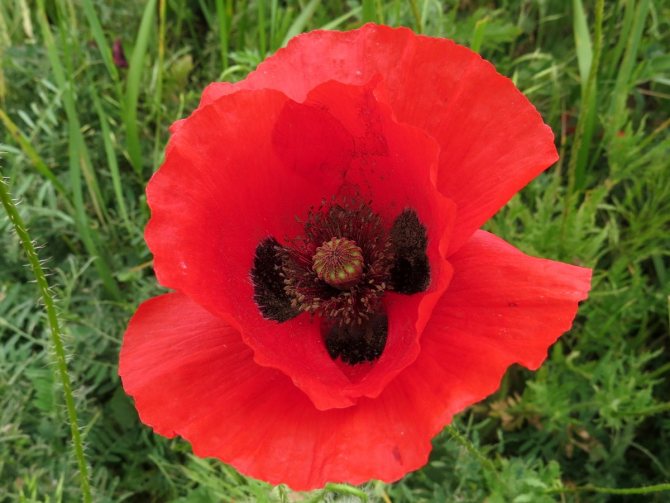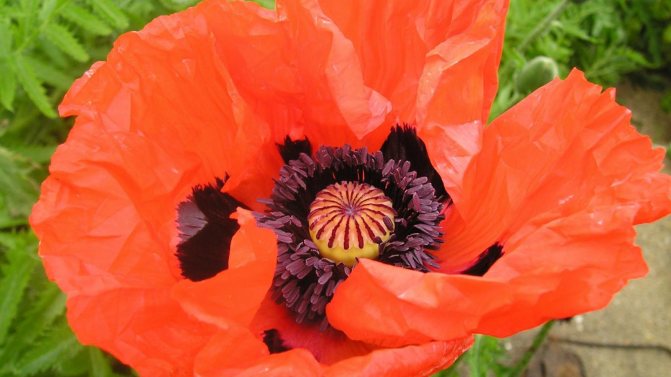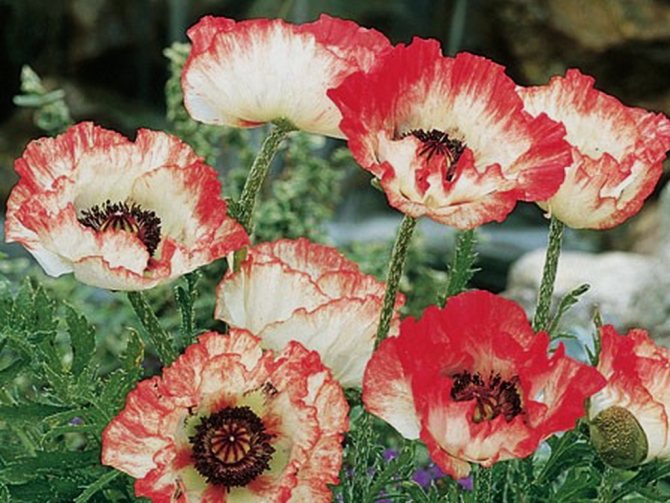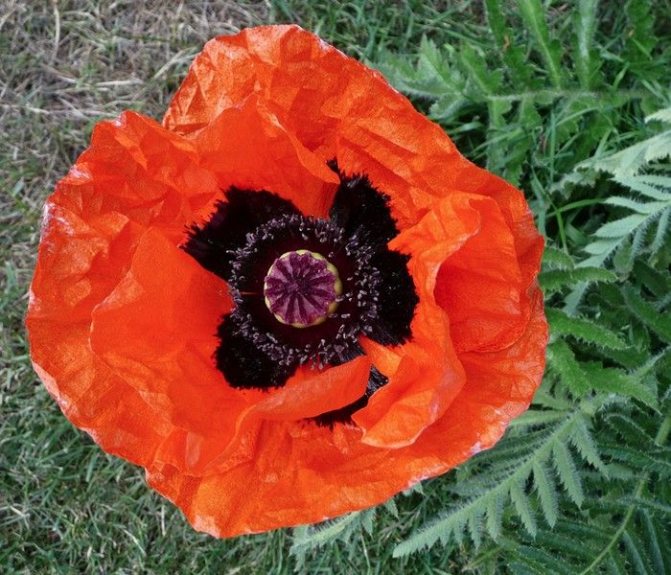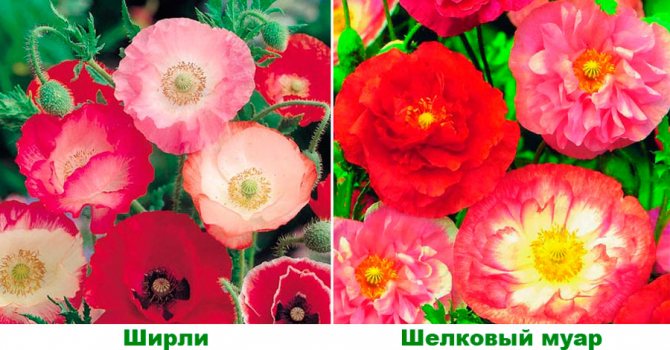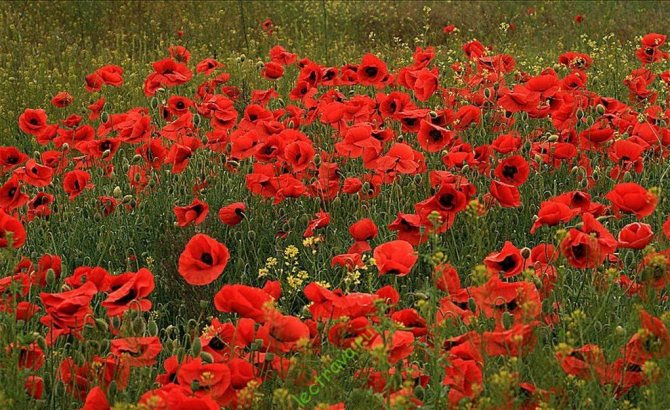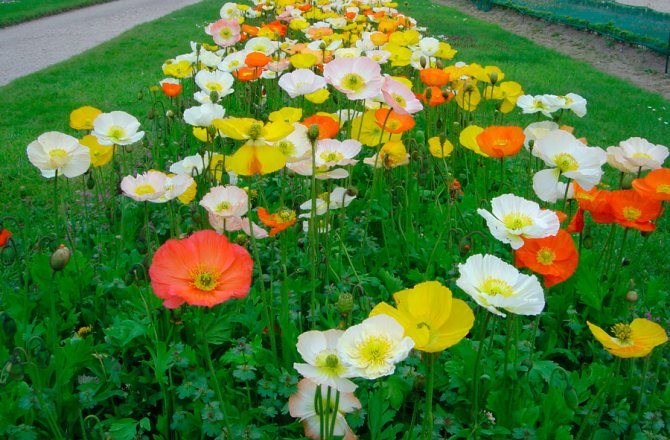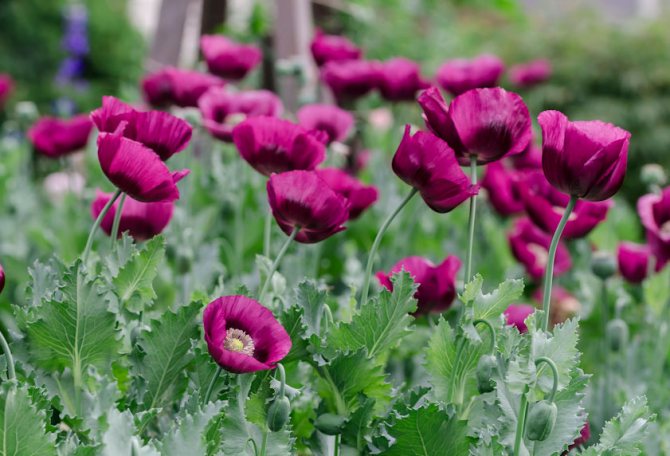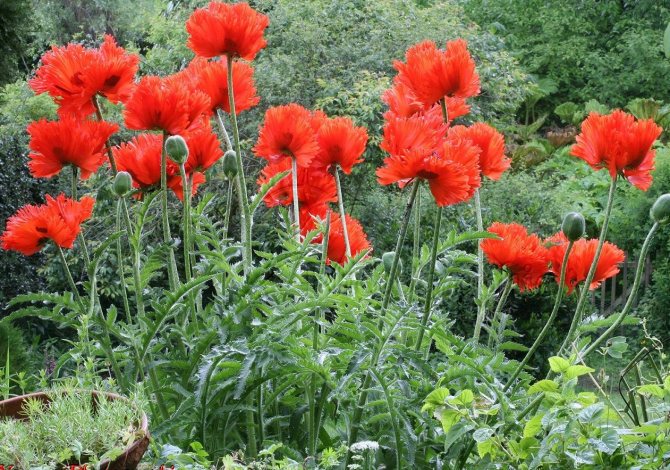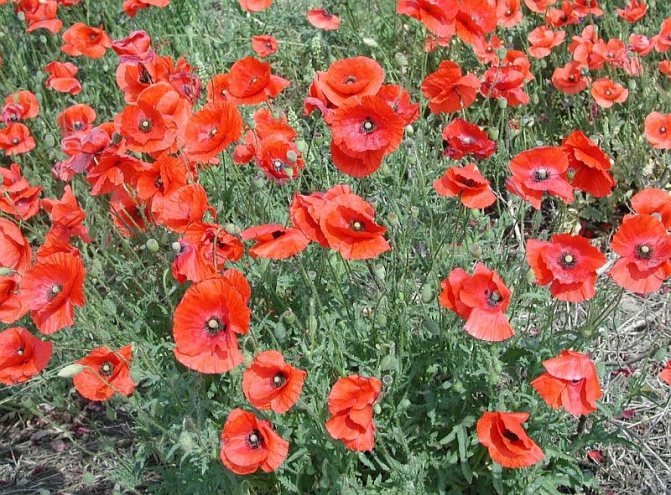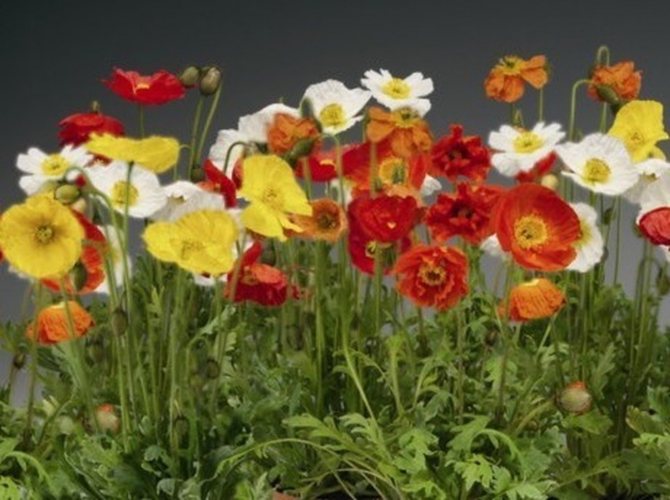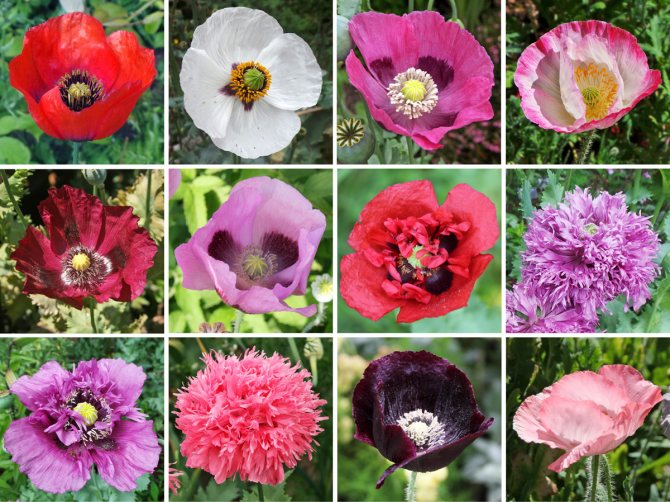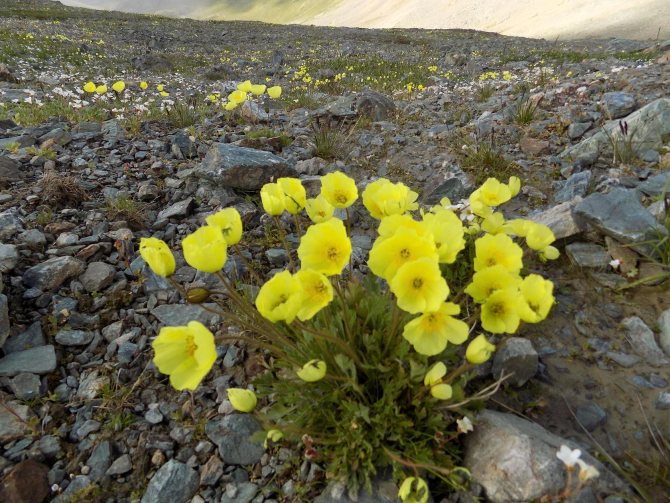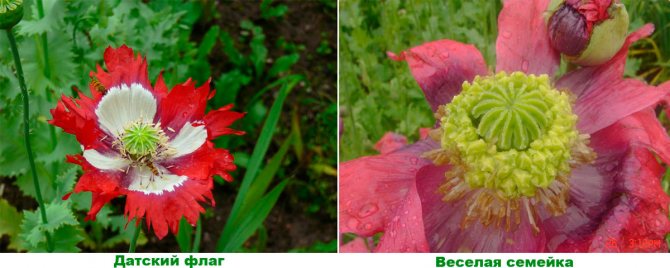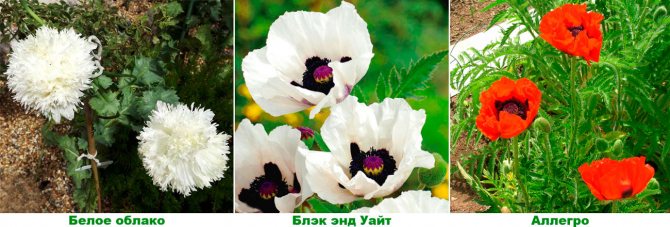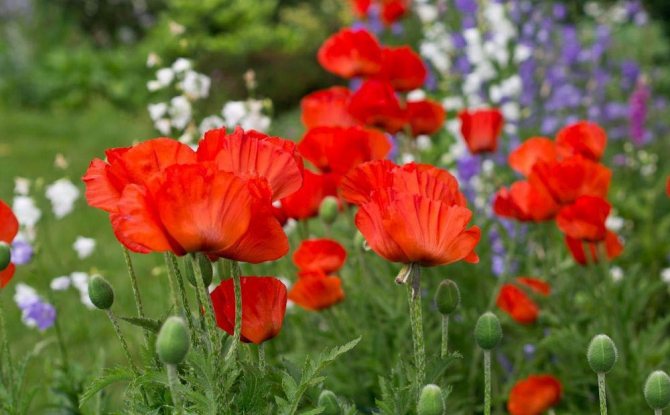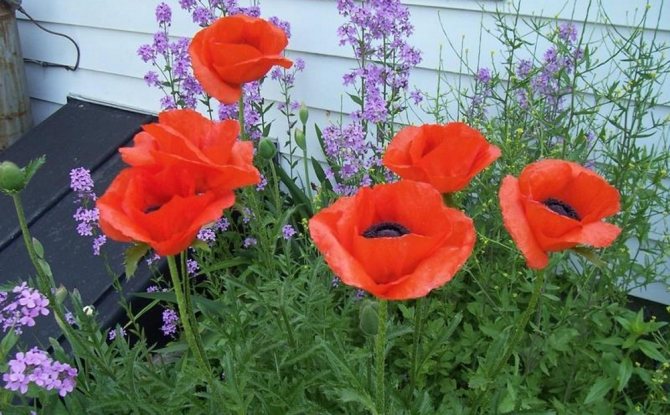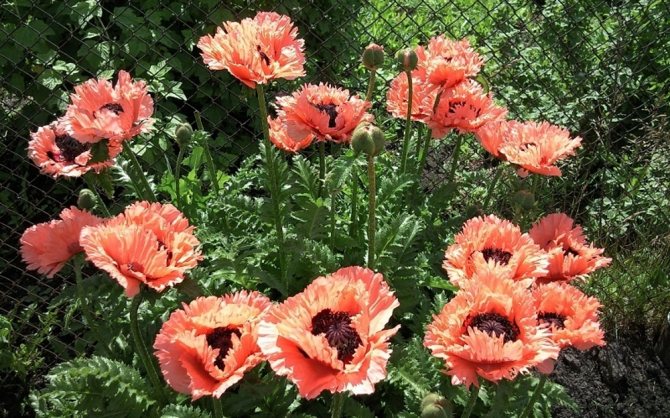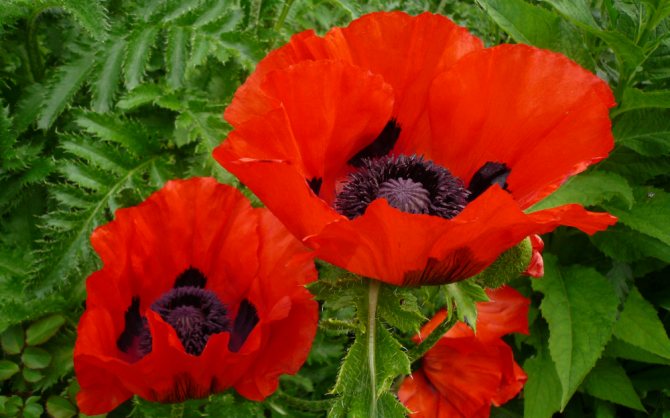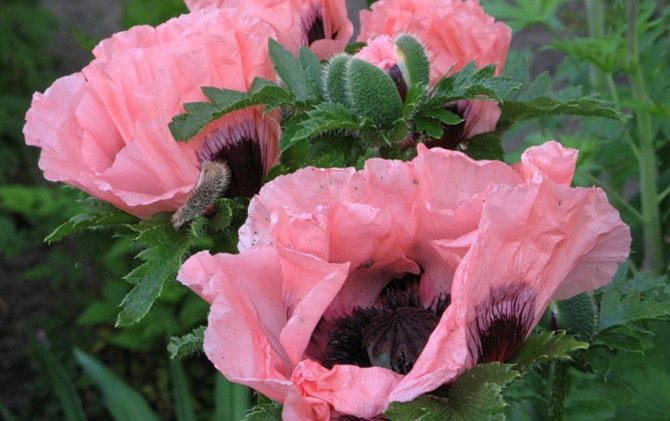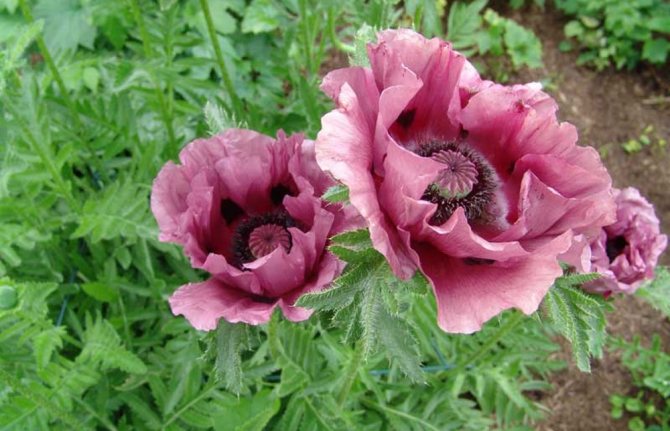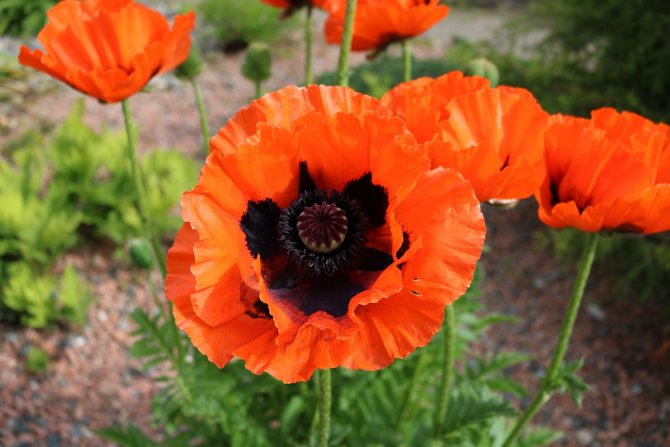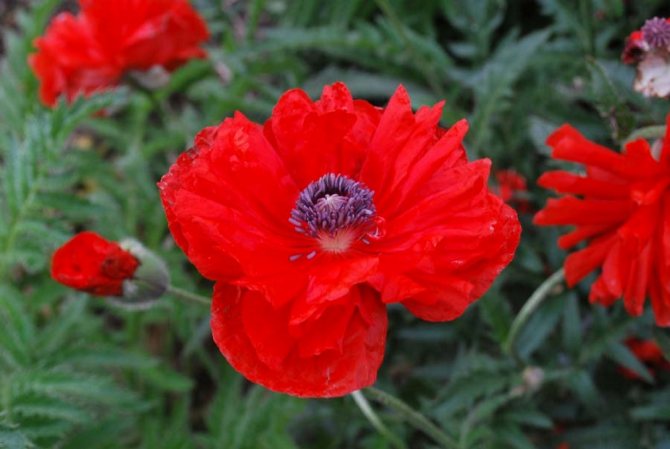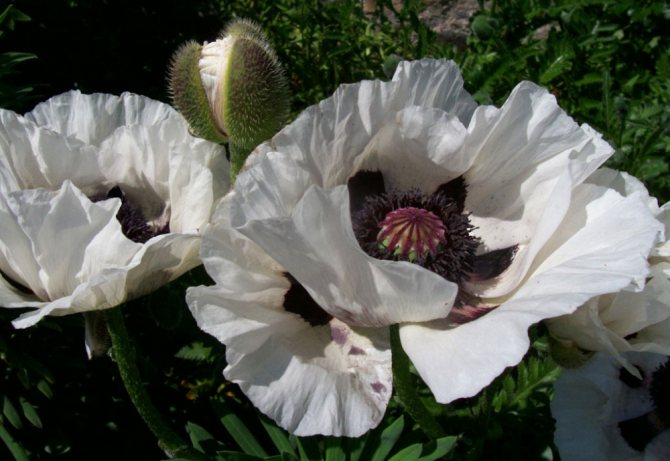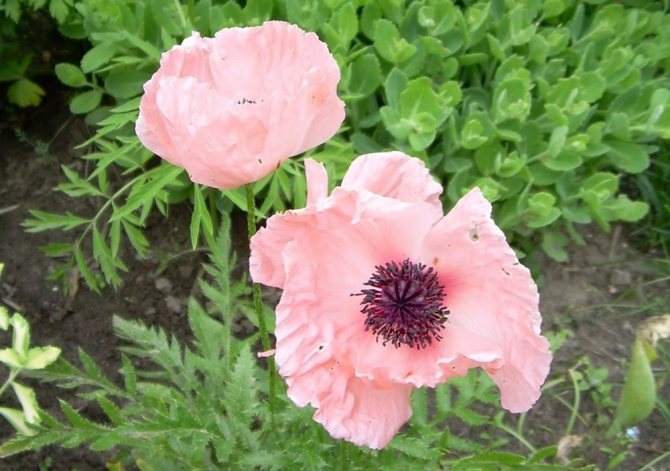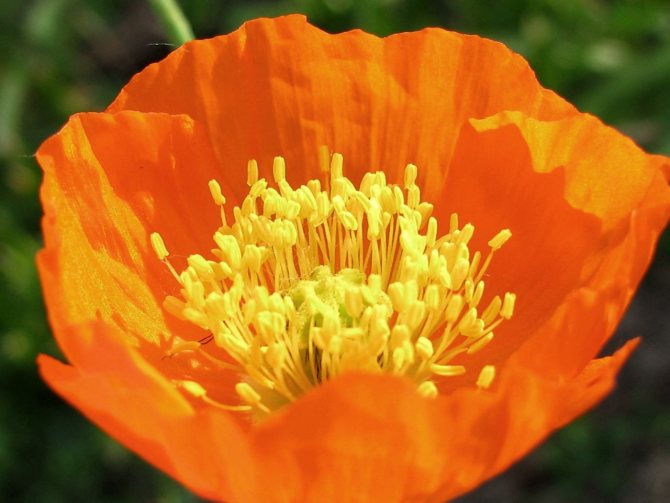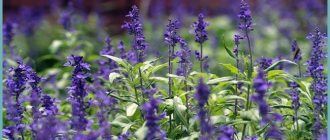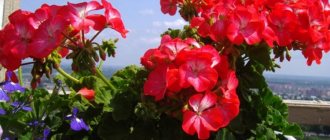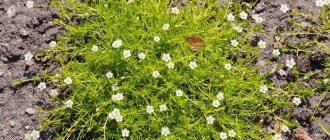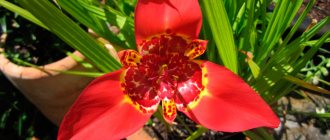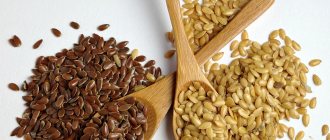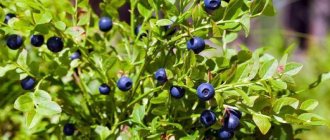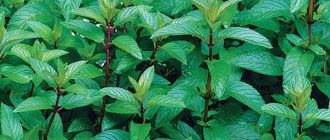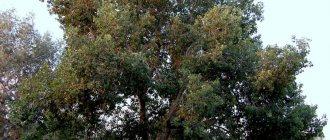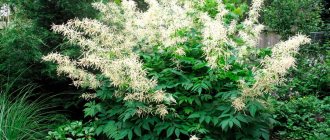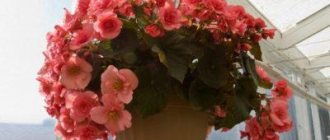The flowering of the oriental poppy is short-lived, but so beautiful that this plant can be called one of the best decorative perennials. Everything is beautiful in him - feathery leaves with hard pubescence, neat buds-cases of two sepals, in which huge flowers are incomprehensibly placed. The crumpled petals resemble a delicate silk fabric that gradually unfolds, and here in front of you is a beautiful corolla of the correct shape of four or six petals, or lush terry. Sepals immediately fall off, and after flowering, the rounded boxes with pores at the top remain on the dried stems and serve as a flower garden decoration for a long time (you can also use them in dry bouquets). Sometimes at the end of summer the poppy blooms again.
Poppies in the garden: a dangerous beauty
Poppies are stunningly beautiful plants that have won the hearts of many gardeners. But not everything is so simple. Among these fiery beauties there are species that forbidden to grow in private gardens... Let's figure it out together.
Poppies are amazingly beautiful plants
In June, these plants amaze with their colorful flowers, which can be large and small, simple and double, brightly colored and calm, pastel colors. Only one question arises: can this plant be grown in gardens? We all know that cultivate opium poppy in many countries strictly prohibited... A poppy flower bed on a site can cost a decent amount of a fine or even lead to imprisonment - it all depends on the size of such a flower bed. Agree, a sad prospect.
Why perennial poppy does not bloom, what to do
The reasons may be different, firstly - very young plants spend all their energy on the growth of the rhizome. Usually, in the second or third year of life, the first peduncles appear, one or two, only for 3-4 years the flowering will be magnificent.
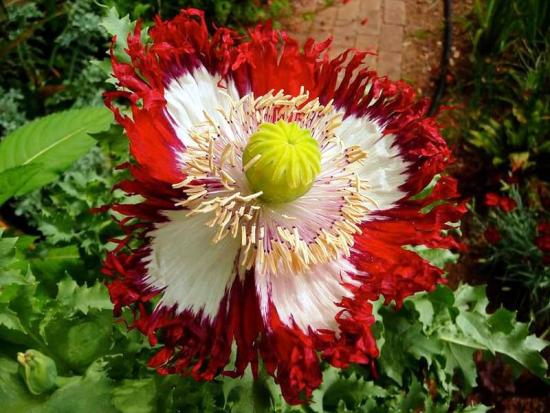
The lack of flowering can be observed due to the strong shade of the site.
Correct care plays an important role in the formation of buds, for example, the plant may suffer from too active loosening, in which the root system is damaged.
Poppy species prohibited for cultivation
Let's find out which poppies should not be given registration in their garden. These include all types that contain narcotic and psychotropic substances. It:
- poppy sleeping pills (Papaver somniferum),
- bristle poppy (P. setigerum),
- poppy bracts(P. bracteatum)
- and, alas, the finest member of the family is the cultivated oriental poppy (P. orientale).
The unpretentious and winter-hardy oriental poppy is good looking for envy. But be careful with this handsome man: the plant contains the alkaloid oripavine, which belongs to toxic substances.
Oriental poppy (Papaver orientale)
By the way, forbidden fatal beauties can be determined by the size of the seed pods: if they are large, then you should not mess with such plants.
What poppies can be grown on the site?
But what if you really want to recreate a meadow with poppies, cornflowers, chamomiles and other meadow grasses on your site? Go for it, because the genus Papaver has more than 100 species, and only a few are banned. You can choose from annual and perennial poppies.
Annual poppy seed grass fits well into planting in a natural style
The most famous representative of the first group is considered poppy seed (P. rhoeas). It fits perfectly into the planting in a natural style. This summer plant blooms profusely from June to autumn. Stunningly beautiful annuals are less common. poppy modified (P. commutatum) and peacock poppy (P. pavoninum).
Among the perennials, it is worth highlighting holosteel poppy (P. nudicaule), which blooms from May to late autumn. Depending on the variety, flowers are double and simple, white, yellow and orange, with a diameter of 2.5-6 cm (in the compact variety 'Popsale' they are already 10 cm in diameter). So, as we can see, there are plenty of legal poppies.
On sale you can find seeds of various varieties, take a look at our market (papaver seeds section) and choose your own!
Breeding methods
The propagation of decorative flowers is one of the main concerns of the gardener. Let's look at various ways to get new plants.
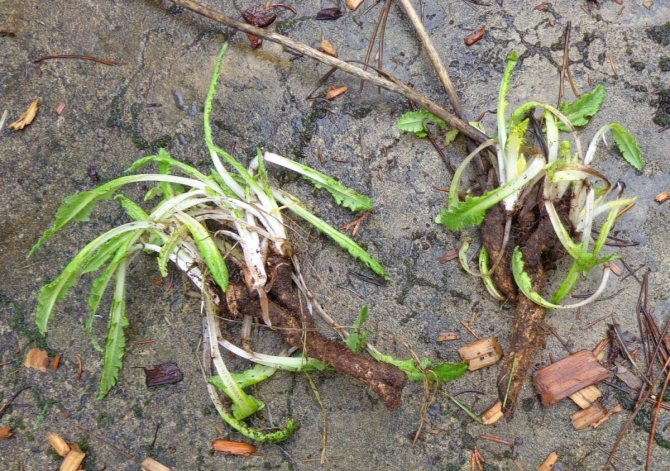

Photo: <>
By dividing the bush
If you need a lot of bushes, this method is for you. The plant is completely removed from the ground, divided and planted at a distance of 70–80 cm in prepared holes. This method is good because the new bush retains the varietal characteristics of the parent specimen. After that, surround the seedlings with care, since it is easy to transplant a bush, but it is not easy to arrange a comfortable environment for it. Water young "delenki" more often.
The division is best done in May or at the end of flowering. If the bush is completely transferred to a new place, all remnants of roots must be carefully removed from the ground in the same place, since they can germinate and spread further.
Sowing seeds in the ground
Reproduction in this way is great for annual varieties. You can collect the seeds yourself and save or leave them for self-seeding - choose whichever is more convenient for you. If you are harvesting the seed yourself, then read the information on when to sow outdoors and what are the differences between spring and fall planting.
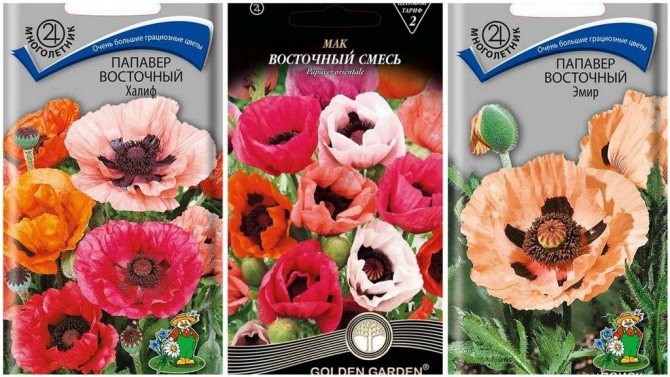

Photo: collage <>
Green cuttings (shoots)
A new plant can be obtained by cuttings. For this, the weakest side shoots are usually chosen. They are cut off, and then placed in a disinfectant solution for a day (you can use root growth stimulants). After that, the shoots are placed in a container with moist, loose soil, covered with a film. After the roots appear, the cuttings can be placed on a flower bed together with a lump of earth, they will take root within 1–2 years.
Root shoots, cuttings
Perennial poppies grow well in several years in one place, so the bush can be divided, that is, propagated by separating part of the root. To do this, you do not need to remove the entire rhizome, you can carefully cut off a part from the side and remove it with an earthen lump so as not to damage the thin roots.
The best time to divide a bush or root is May, when the plant is not flowering, and the period after flowering ends. Planting with rhizomes can produce up to 20 new plants from one large bush 3-4 years old. You can also visit a garden store, where you can buy ready-made "cut" rhizomes.
What poppy can be planted on the site
Nowadays, it is rare in any garden that you can find silk flowers of poppies, which until recently adorned literally every site. And after ripening, it was possible to collect the boxes, pour the seeds out of them, etc. send them to your mouth. Well, they are just very tasty. There were.
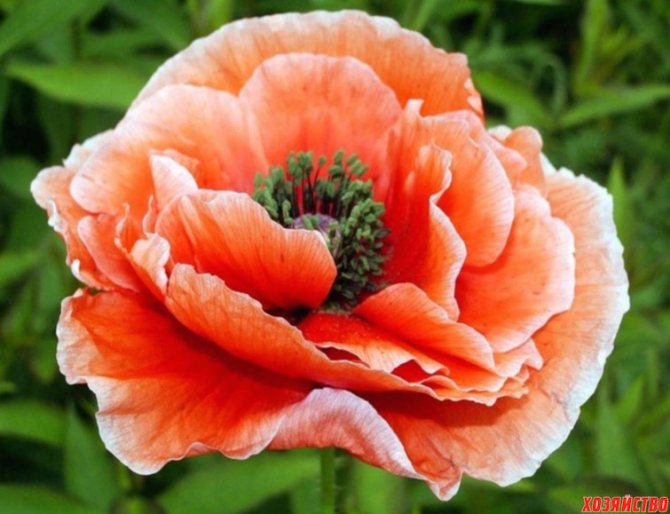

Now people are afraid to grow poppy on their plots.Yes, and it is impossible - a ban has been imposed on the cultivation of poppy in Russia.
So what is the fault of this delicate flower? Let's figure it out.
The family of poppies is huge: there are both annuals and perennials. There are varieties with simple flowers, and there are varieties with double, more like peonies. But. Any poppy contains narcotic substances. Therefore, according to the law, there should not be any poppy in the country. It must not be grown for any good purpose, not for culinary or cosmetic purposes.
Gardeners are often misled by the horticultural firms that sell poppy seeds. Usually under the guise of decorative. Poppy seeds are often found in a mixture of flowers (for example, in a mixture of a Moorish lawn). So an illusion arises - since the seeds are sold, it means that you can plant. In the end, we plant it for beauty. This is not the case, if a gardener has planted a poppy containing narcotic substances on his plot, it means that he is breaking the law, and under the law he faces punishment.
So what kind of poppy shouldn't be grown?
Now the following types of poppy are not available to gardeners for cultivation: hypnotic, bristle-bearing, bracts. But that's not all. It is forbidden to grow varieties of poppies, the diameter of the capsule of which is from 2-5 cm and more. Usually these are all annual poppies and some varieties of perennials. This is especially true for oriental poppy, which gardeners love to plant.
What threatens for a flower garden with poppies?
Of course, the real term for a simple grower is unlikely to be awarded. To begin with, they will warn and ask all the poppy flowers to be pulled out and disposed of. If you disobey or zealously stand up for the flowers, driving police officers away from the flower garden with a pitchfork or a rake, you will receive a fine. Well, those who grow poppy products on a large and especially large scale (this does not apply to flower growers) face a serious period.
Description
Mac is well known for a long time. Even in ancient Rome, it was successfully used for medical purposes. Archaeologists have found poppy seeds in buildings from the Neolithic period. The ancient Egyptians used the decoction prepared from the plant as an analgesic remedy. Medicine women, making a potion, used red poppy as an additional component. To ward off evil spirits from their home, people scattered poppy seeds on the doorstep.
Poppy seeds contain about 55% fats and 20% proteins, there are also vitamins, carbohydrates, trace elements.
Even in ancient times, poppy was used for the manufacture of hypnotics, anthelmintics and pain relievers. In the recipes of traditional medicine, poppy seed is often used for making tea, decoction and infusion. These drugs are effective as a sedative and analgesic, relieve coughing attacks, and are used for gastric disorders, dysentery, and diseases of the bladder.
What kind of poppy can be grown in a personal flower garden?
The correct answer to the question, what kind of poppy can be grown in the country: none. Many summer residents are sure that the ban applies only to opium poppy, while oriental poppy, for example, can be planted, and wild poppy generally grows on its own, without demand. There is an opinion that "our northern" poppies, unlike the "southern" ones, do not contain anything narcotic and that it is not forbidden to have up to 3 poppy bushes - so to speak, for beauty - on the site.
In fact, all of the above are delusions. As explained in the UFSKN in the Moscow region, it is prohibited to sow any varieties of poppy, since they all contain opium. At the dacha, according to the law, there should be no poppy, it cannot be planted either for culinary purposes or for beauty, and the number of bushes also does not play a role, even one scarlet "poppy" at the fence is illegal. By the way, more than 10 poppy bushes are already large plantings, and the gardener may have major problems because of them.
It happens that the summer resident has not gone to his site for a long time and simply does not know that there is not only grass near the house, but also the poppy has grown.If it really has grown, the owner of the dacha may have another unpleasant and unsafe surprise - drug addicts can take note of the site. It is their interest in other people's poppy bushes that makes even the most avid gardeners refuse poppy, who, from old memory, still continued to grow it.
How events will develop if the owner of the poppy plantings does not know about them, the Department of State Drug Control for the Moscow Region explained:
- Ignorance of the laws does not absolve from responsibility. The site owner will receive an official order from the authorized body for the destruction of wild-growing narcotic plants and will have to take all necessary measures. For a law-abiding citizen, this is where it all ends.
For poppy in the country they can issue a warning, fine and even condemn - it all depends on how the poppy bushes ended up on the site, how many were found and how the summer resident reacted to the official order to destroy his plantation. For "failure to take measures" ordinary citizens can receive a fine of up to 2 thousand rubles, legal entities - up to 40 thousand. As for the deliberate sowing and cultivation of prohibited plants, for such cases in the Criminal Code there is Article 231. According to it, these crimes “are punishable by a fine in the amount of up to three hundred thousand rubles or in the amount of the convicted person's salary or other income for a period of up to two years, or restriction of liberty for up to two years, or imprisonment for the same period. " This is the case with poppy plantings.
important!
In addition to poppy, in Russia it is forbidden to sow and grow for any purpose khat shrubs, hemp, mushrooms containing psilocybin, coca bush, Williams' lophophore cactus containing mescaline, and ephedra, which, by the way, grows by itself in the southern regions like a weed.
Decorative poppy at their summer cottage. What is the penalty?
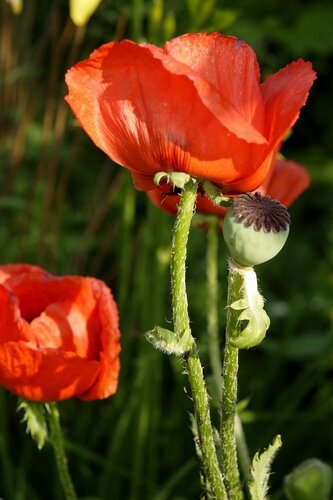

Poppy is a traditional decoration of flower beds in dachas and personal plots. Let's try to figure out how the purchase of even one packet of seeds of this beautiful flower can end up with a respectable amateur florist. Let's say that he knows about drugs and the State Drug Control Service only from the media.
There is law No. 454 "On the prohibition of the cultivation of plants containing narcotic substances on the territory of the Russian Federation." An amateur flower grower should pay attention to the fact that not only opium is prohibited, but also "other types of poppy containing narcotic substances." Our law-abiding amateur florist is afraid even of the mention of any drugs like fire. And he is not going to grow any filth on his site. He only carefully looks after a beautiful flower, shows it to his guests and neighbors. It was from them that the amateur florist learned that his favorite plant is called oriental poppy, which cannot be grown. It turns out that oriental poppy contains oripavin. This substance is included in the list of psychotropic and narcotic substances, as "has the potential for drug addiction." Moreover, oripavin is very toxic, so it is not used in medicine as a pain reliever. It is impossible to grow oriental poppy.
Poppy in the garden: planting, care and cultivation
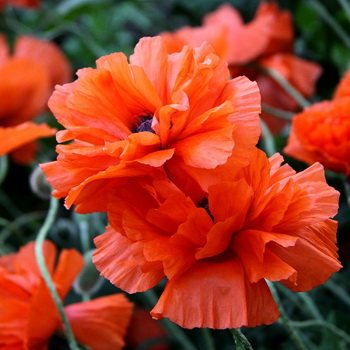

Poppies grown in the garden will become bright accents of any flower bed or mixborder. There is a belief that poppies grow where the battles took place, and their colors symbolize the drops of blood of the fighters. When growing garden poppies, dry, sunny areas are chosen, since these steppe plants, which are widespread in nature in the Caucasus and in the semi-deserts of Central Asia, do not tolerate stagnant moisture.
Garden poppy and its seeds
Plants with large flowers of a wide variety of colors. In culture, there are annual species and varieties with a height of 20 to 120 cm with simple and double flowers. Simple flowers are more resistant than double flowers, but the latter bloom more magnificently and richly.The flowering period is short as the flower petals fall off quickly. To lengthen the flowering period, poppies are sown, starting in May, every 10 days. Thus, it is possible to have blooming poppies all summer long.
As you can see in the photo, the garden poppy bush has little or medium branchy:
Plant care
Planting ornamental perennial poppies and caring for a flower bed will not require much attention, but you should know some aspects, which will be discussed below. Watering is the main component of flower care.
Thanks to the taproot, the poppy can easily extract moisture from the depths, and the pubescence of the stem and leaves increases drought resistance. But it is better to ensure regular watering during a drought, but stagnant water will be destructive. After some time after watering, gently loosen the soil so that no crust forms on the surface and air can penetrate into the soil.
Fertilization and feeding
Organic or mineral fertilizers are applied to the soil in early spring before the beginning of the growing season. It is also useful to carry out top dressing just before flowering - this will help the formation of buds.
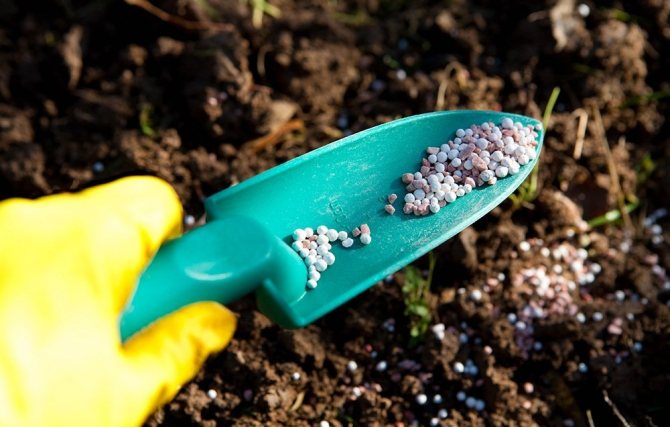

Photo:
Flower pruning
Withered flowers need to be cut off in a timely manner, if the collection of seeds is not planned, since the plant spends energy on the formation of a capsule.
Post-flowering care
When the poppy has faded, you can leave the pods to develop, then the poppy will multiply on its own. You can often see gauze bags on the buds - this is how seeds are collected. They are stored in boxes or removed. After collecting the seeds, the ground part of the plant is completely cut off, mulch before the cold weather. If your region has severe winters or you plant it under the snow, you can additionally cover it with a film.

